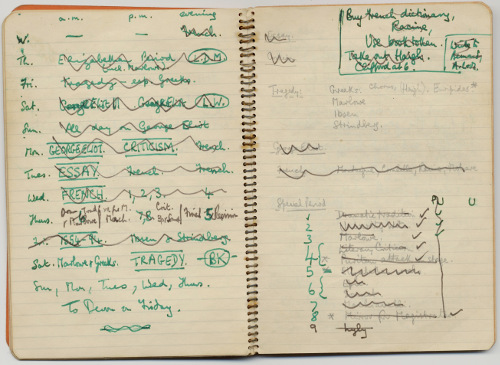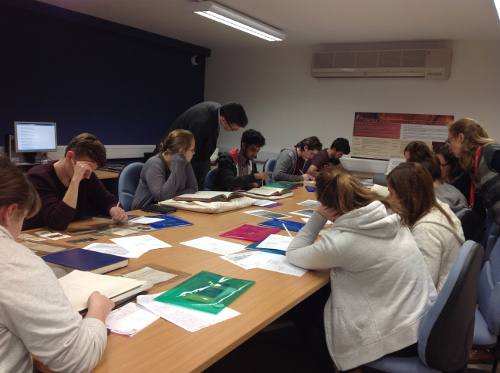Archives Hub feature for October 2017
“Culture is one of the two or three most complicated words in the English language”– Raymond Williams, ‘Keywords’ (1983).

A collection level description of the Raymond Williams Collection has been available on the Archives Hub for several years but in recent weeks the entire catalogue has been exported from our CALM database and made live. This is one of the outcomes of Archives Wales Catalogues Online, a collaborative project between the Archives and Records Council Wales (ARCW) and the Archives Hub to increase the discoverability of Welsh archives. This project was supported by the Welsh Government through its Museums Archives and Libraries Division, with a grant to Swansea University, a member of ARCW and a long-standing contributor to the Hub.
The papers of the renowned cultural critic and writer Raymond Williams (1921-1988) were catalogued courtesy of funding from the Barry Amiel and Norman Melburn Trust, the College of Arts and Humanities and Information Services and Systems at Swansea University. The collection has been extensively used by researchers from the UK, Japan and America since it was catalogued, it is hoped that the inclusion of item level descriptions on the Archives Hub will promote its potential use further and wider.

Raymond Williams is probably best known for his notion that culture is ordinary. Through published works such as ‘Culture and Society’ (1958), he was one of the leading academic figures undertaking research and publishing works that explored and redefined ‘culture’. Other seminal works written by Raymond Williams included ‘The Long Revolution’ (1961), ‘The Country and the City’, ‘Keywords’ (1976), ‘Towards 2000’ (1983). As a major intellectual figure of the twentieth-century, Williams is recognized worldwide as one of the founding figures of Cultural Studies.
As well as his productive academic career, which included becoming the first professor of drama at Cambridge University (1974-1983) and the ten works published, Raymond Williams also published seven fictional works. The first was ‘Border Country’, which was set in the landscape of his childhood, in the rural area between England and Wales. Originally published in 1960, it was re-issued in 2005 by Parthian as part of the Library of Wales series, with Dai Smith, his biographer, claiming it to be ‘the Greatest Welsh Novel’. Other fictional works include the two volumes of ‘People of the Black Mountains’ which were prepared for publication by his wife, Joy Williams, following his death.
The prodigious writing ability of Raymond Williams went beyond academic works and novels. He wrote weekly book reviews for ‘The Guardian’, reviews for other publications, as well as a regular column in ‘The Listener’ which revealed his keen interest in television and film. Raymond Williams also wrote newspaper type publications to explore and convey ideas, such as ‘The Cambridge University Journal’ when he was at university, and ‘TwentyOne’, the weekly newspaper of the 21st Anti-Tank Regiment that he edited and contributed to during his active service during World War Two, under the name of Michael Pope and other aliases.

The collection held in the Archives shows the full range of Raymond Williams’ creativity:
- manuscripts and typescripts of draft and final versions of novels, dramatic works, poetry and academic writings
- newspaper articles and reviews
- professional correspondence
- personal and family papers (including his diaries)
- talks, lectures and debates
This comprehensive collection is illustrative of how he could explore and express ideas in many formats and on many subjects; culture, drama and literature, politics, communications and media, sociology, language, technology, history, war and ‘The Bomb’, class, education, region and geography.
The breadth and depth of ideas within the archives mean that the Raymond Williams collection can be used in a multitude of ways. For example, groups of undergraduate and postgraduate students have used items within the collection as part of their courses studying World War One, the General Strike, World War Two, the Cold War and nuclear disarmament, as well as culture, literature, education and social policy. It is a ‘go to’ collection for material to display for VIPs and other visitors.

This collection has been the catalyst for fascinating conversations in the Reading Room about Raymond Williams as a writer, researcher, teacher, as well as discussions about some of the questions posed by the archive: challenging handwriting, apparently random notes and half-finished texts, who wrote what – was it Raymond or was it his wife, Joy?
We look forward to receiving more enquiries about the collection and seeing this valuable archival material being used for to its full potential.
“To be truly radical is to make hope possible rather than despair convincing” ― Raymond Williams, ‘Resources of Hope’ (published posthumously in 1989).
Dr Katrina Legg
Assistant Archivist
Richard Burton Archives, Swansea University
Related:
Explore the Raymond Williams Collection on the Archives Hub.
Browse Swansea University Archives collections on the Archives Hub.
All images copyright Swansea University / family of Raymond Williams and reproduced with the kind permission of the copyright holders.
